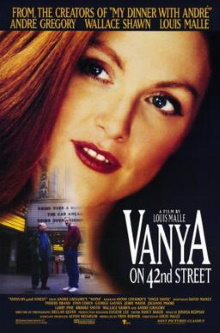It’s safe to say that everyone has heard of Anton Chekhov if only because of his famous dictum of creative writing using a gun as an example. But I don’t believe that I have actually read or watched any of his work. So it’s neat to watch this adaptation by essentially the same core team who made My Dinner with Andre. As usual, this is a talk fest that threatens to be deadly boring at first but it is very engaging once you know all the characters.
A group of actors gather in an old theatre in New York City to rehearse Chekhov’s Vanya with only a small invited audience. The play itself is about Vanya who manages an estate in the countryside complaining about an extended by the estate’s owner, the Professor Serebryakov and his new and beautiful second wife Yelena. Vanya is himself the brother of the professor’s first wife and his niece, Sonya, the daughter of the professor and his first wife, resides on the estate as well. Vanya is resentful that he has spent his whole life supporting Serebryakov who he once believed is a great academician but he now believes him to be an intellectual fraud. He is also in love with Yelena and uses her to symbolize his own lifetime of disappointments. Meanwhile a frequent guest at the estate is the local doctor Astrov who has a deep interest in preserving the nearby forests. Sonya is in love with him but fears that she looks too plain to attract anyone’s interest. She asks for Yelena’s help to find out if Astrov has any feelings for her at all but naturally it turns out that Astrov too is attracted to Yelena.
This film itself seems to be something of an afterthought, an attempt to document a theatrical workshop that the team was doing anyway. It pretty much takes place in the old theatre as is with minimal props and the actors all perform in their own street clothes though of course the story itself takes place in late 19th century Russia. The actors don’t attempt to use any Russian accents either and while they keep the original names of the characters, the English that they use is modern. There is some meta-level stuff with the actors being out of character in between scenes and Andre Gregory appearing as the play’s director, even though the film’s director is Louis Malle but for the most part this is very much just the play itself caught on film. As I noted, the minimalism and sheer talkiness of this presentation makes it tough to get into for someone with no prior knowledge of the play. For my part, I also disliked that this is mainly about Vanya grousing about a wasted life and I’m not sure how seriously to take his claims that he could have been a great writer himself is his life had taken another path. Still once you know all of the characters, you do get caught up in their family drama and emotional turmoil.
While I can certainly understand the plot and the motivations of the various characters, I’m hesitant to form conclusions of my own with regards to the overall theme of the play. As expected from a Russian writer it is depressing with pretty no one getting what they want. Then it ends with everyone more or less resigned to accepting things as they are with Sonya trying to comfort Vanya by promising that they can look forward to rest and joy in the afterlife but in the meantime they must work. I can’t say that this messaging appeals to me at all but I suppose it reflects the reality of the times they lived in and I find it notable that instead of railing against the injustice of society, this piece essentially has the characters give in to the inevitable. One element that I don’t quite understand is the character of Vanya’s mother. She sides with Serebryakov, telling the family to do whatever the professor wants even though she is one of those left behind in the estate. Since it doesn’t seem she is the kind of person who would admire intellectual ability, I take this to mean that she is by nature simply deferent to authority, the type to endure society as it is instead of seeking to change anything.
In the end, I find this to be worthwhile mainly for its educational value as I am unlikely otherwise to ever see a play by Chekhov. Unlike My Dinner with Andre, there isn’t anything in the dialogue here that speaks to me personally and I don’t find Vanya’s complaining about having wasted his entire life to be particularly sympathetic. To me this play is a product of its time and given the explicitly Christian appeal to the afterlife at the end, it’s hard to see it having lasting appeal outside of this context.

One thought on “Vanya on 42nd Street (1994)”